|
|
| 'Like' us on Facebook | Follow us: |
Posted on: Aug 16, 2015
 |
 |
Part 01 || Part 02 || Part 03 || Part 04 || Part 05
We live in times when more than one billion women, or one in three women, around the world do not have access to safe sanitation while one in ten women do not have access to clean water. Today dirty water kills more women than cancer. Half of India's 445 rivers are too polluted for drinking. Presently the richest one percent of the world own more than the rest of humanity combined. A Mumbai-based medical second opinion services center has revealed that 44 percent of suggested surgeries were needless. One third of the food produced in the world is wasted while 870 million go to bed without food everyday. Indiscriminate human action is showing up as environmental crisis like never before, and technology and globalization has made us so interconnected that acts of avarice in one corner of the world seems to affect the poor man in the other.
This does seem to be a real pickle we have got ourselves into. We generally tend to look for new solutions for new crises, and in the process we create new issues. Any reference to values, austerities or spirituality as solutions is often mocked at as regressive. In a sense it is not completely right to blame the younger generation for such contempt, for what has been lacking is the presenting of this time-tested wisdom in the modern context. We do teach our children that the solution for all problems lies in Bhagawan's message, but what we need to do is help them see that message in the background of the modern day happenings. And that is where the works and writings of Prof. G. Venkataraman have always stood out. With his immense knowledge of history and current affairs, and his passion to point out to the relevance of Bhagawan's message in this time and age and for the future, his writings always make for inspiring and interesting reading.
If we were to define in one phrase the problem we face in the world today, we could probably say 'decline in Dharma' - Dharma being a word pregnant with meaning and wisdom. No wonder Bhagawan wrote an entire book explaining this one value. 'Dharma Vahini', which was a series of articles written by Bhagawan for the Sanathana Sarathi and later compiled into a book, describes and dilates on the various nuances of Dharma. And Prof. Venkataraman's musings series on this Vahini presents in modern context this wonderful book's timeless wisdom. This series we begin today is the transcript with illustrations of the musings series aired on Radio Sai in 2007-08. You can look forward to a new part of this series on the 13th of every month. This too is part of the Radio Sai offerings for the 90th year of the Divine Advent. For how can the celebration of the life of our Divine Master be complete without a sincere study of His message. So let us with prayers, join Prof. Venkataraman in this journey through the Dharma Vahini.
Loving Sai Ram and greetings from Prasanthi Nilayam. If you recall, last time, I narrated the story of the pen Swami gave me and His remark that in life everything is spiritual. I added that this is exactly in the spirit of the Gita, and mentioned that I would explain that remark next time. So maybe I should begin by fulfilling my promise!
In the Gita Vahini, Swami says that while one acts in the present and in relation to worldly circumstances, one must, however, perform the action with the Eternal in view. What is it that is Eternal? God or the Atma; therefore always performing one’s duties keeping God in view is the essence of the Gita; Swami told me the same thing by remarking that in life everything is Spiritual; there is no such thing as this is worldly and does not concern God, that is Spiritual and therefore relevant to God, and so on. Such factorisation is immature, unwarranted and totally uncalled for; certainly, such segmentation does not get any sanction or approval from Vedanta. The separation is an artefact invented by humans to dodge practicing Dharma.
I am not making this up. Recently, when I commented on corruption I received many mails protesting that corruption was simply a way of modern life and that it was not correct to bring in Spirituality, morality, etc. One devotee even wrote, ‘In our company, we simply call it speed money - that is money paid for the speedy rendering of service!’ Pretty ingenious I would say, but all that does not wash sin into morality; at least, if I understand Dharma Vahini properly, there is no way in which such legitimacy can be conferred on patently immoral acts. All this, just by way of reinforcing the point that every action MUST be Spiritual.
With this background, let us hear the next quote of Swami:
"You may claim that you live according to Dharma. But, your basic flaw is that your acts are not done in the spirit of dedication. If so done, it gets stamped with the authentic mark of Dharma. Some clever folk might raise a doubt and ask: 'Can we then kill and injure, in the name of the Lord dedicating the act to Him?' Well, how can a person get the attitude of dedicating all his activities to the Lord without at the same time being pure in thought, word and deed? Love, Equanimity, Rectitude, Non-violence - these are the attendant virtues of the servant of the Lord. How can cruelty and callousness co-exist with these virtues?"
I suppose the message is loud and clear. One cannot claim one is a devotee of God and use that as an excuse to offer to God anything and everything, especially immoral acts. This is not at all farfetched. I know for a fact that people pray to God and even go to temples and perform special pujas and what not so that some business venture of theirs, often based on shady practices, would succeed. Here one is trying to do business with God! Is this what God expects of us? If you do not believe me, all you have to do is to make a trip to Tirupathi and watch how devotees offer all sorts of things to Govinda, most of the time as an advance payment or as a quid pro quo!
The human mind, said a wise man, has infinite capacity to trick itself! Indeed, just as the mind tricks many into legitimising immoral acts simply by offering it to God, the mind equally offers its own definition of Devotion or Bhakti. Here is what Swami says about this practice:
"Simple folk believe that they have Bhakthi towards the Lord, but they do not pause to inquire whether the Lord has Love towards them! People who pine to discover this are rather rare. That is really the true measure of spiritual success."
Yes, there is no use in declaring our Love for God; the real point is whether God is ready to accept our declarations. In the quote just offered, Swami refers to the devotee pining for the Lord. I know of one example, where the devotee constantly did this; I am referring to the great musical saint Tyagaraja, to whom Swami often makes a reference. Tyagaraja literally lived all his life with Lord Rama, from morning to evening and in many of the innumerable songs he composed in honour of the Lord, the saint wails and cries to have Rama’s attention. That is pining.
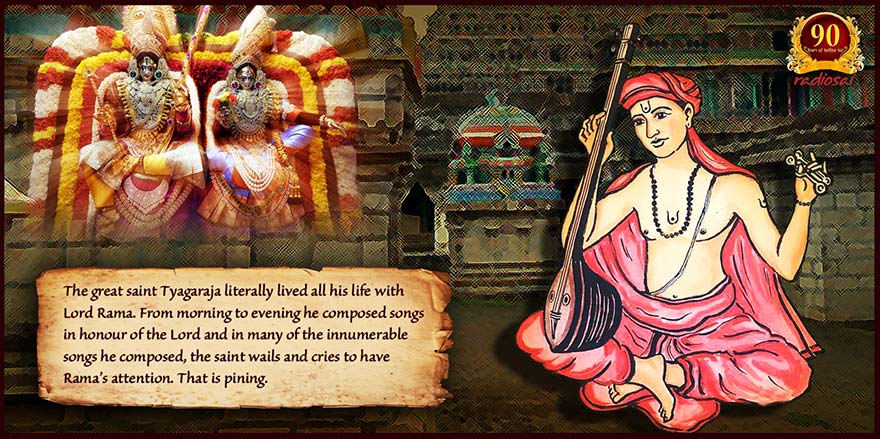 |
The next quote of Swami is a bit technical, and maybe I should say a few words by way of preparation. I don’t know whether you remember my mentioning earlier about the Fundamental Principle and derived Practical Dharmas, so-called. In the quote that follows, Swami would be making a reference to many such specialised packages meant for men and women, people who are householders, elders and so on. The essential point that is made is that while there are any number of derivative packages, they had all better be consistent with Atma Dharma. Perhaps you find that difficult to understand; don’t worry, I shall explain that but first let us have the quote:
"As wood is turned into furniture and used, Atma Dharma has to be shaped into Grihastha Dharma, Vanaprastha Dharma, Varna Dharma, Stri Dharma, Purusha Dharma etc. The stuff is the same in all; the substance is identical, in every separate form. How can the substance be used up? It can only be transmuted and transformed and the various modifications named differently when used for different purposes. The Atma Dharma can be viewed piecemeal and compartmentalised for different purposes, as the wood is hewn and sawn and joined, and arranged and rearranged, but, it is Atma dharma nevertheless. So long as the different systems of Dharma are derived from that ‘Wood’, there is no harm; remember however that the furniture can never be regrouped into the original tree! Apply that Atma Dharma in the fields of worldly activity but do no call the worldly Dharmas, Atma Dharma! That will be playing false to the Ideal, the Absolute."
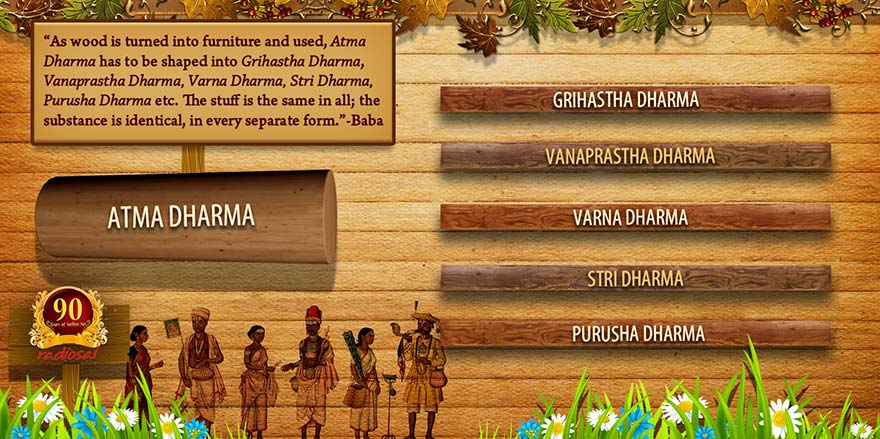 |
So what exactly does this quote mean? I have touched upon this point earlier but maybe I should explain it once more somewhat differently so that you understand it better.
Every country has a constitution; America has one, India has one and so on. Everywhere, the Constitution is held to be the fundamental and guiding principle; all laws made by the legislature or rules promulgated by the executive authority, must always be in full conformity with the Constitution. The laws passed and the rules laid down are derivatives, and unless they conform to the Constitution, they are likely to be dismissed by the Courts as ultra-vires or illegal. Swami is saying something similar.
In the days of yore, Emperor Manu is supposed to have made up many such packages and these are collectively referred to as Manu Dharma. These packages are very useful at the working or practical level, but occasions can arise when they may not be clear; in those circumstances, one has to check out the action contemplated or one’s interpretation of Manus’ Rule Book by referring to the basic principle or Atma Dharma. If it does not pass the test, then out it goes. By the way, this was the fundamental teaching of Krishna to Arjuna. Arjuna wanted to drop out saying it is a sin to kill. Yes, it is a sin to kill, but as Krishna pointed out if by dropping out one is failing to protect Dharma, a mandated duty, then one is actually on the side of Adharma! That is what emerges when the acid test of the Fundamental Principle is applied. Since I have discussed this extensively elsewhere, I shall not pursue that angle any further here.
Let us move on to the next quote:
"Dharma is the moral path; the moral path is the Light; the Light is Ananda. Dharma is characterised by holiness, peace, truth and fortitude. Dharma is Yoga, Union, Merger; it is Sathya. Its attributes are justice, sense-control, sense of honour, love, dignity, goodness, meditation, sympathy, non-violence; such is Dharma that persists through the ages. It leads one on to Universal Love and Unity."
The quote is short but full of deep meaning and we need to digest it slowly and carefully. Dharma is a word that is so vast in scope that it is not easy to give meaning to it like one normally does in a dictionary. In fact, the nuances of Dharma being so unique to India, it is difficult to use the metaphors of a foreign language and describe its scope, as I am now trying to do.
The first thing that Swami says is that Dharma leads one to Ananda or eternal Bliss; in other words, if any justification is needed for following Dharma then this is it; by following Dharma one can attain permanent union with God or merger as it is often called, and such a merger leaves one in a state where time stands still, one is eternally happy and beyond the reach of any pain whatsoever.
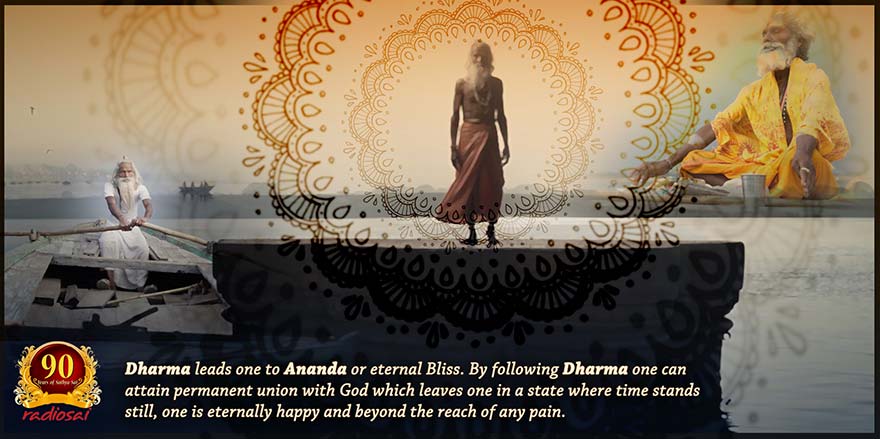 |
"Wherever there is adherence to morality, there one can see Sathya-dharma in action. In the Bhagavatha too, it is said, ‘Where there is Dharma, there is Krishna; where there are both Dharma and Krishna together, there is Victory’. Dharma is the very embodiment of the Lord; since the world itself is the body of the Lord, the world is but another name for the Moral Order; no one can deny it now or ever."
The words that I just quoted are extremely important and need some intense reflection. Basically, it deals with an important issue, namely, making Sathya and Dharma the basis for all actions. In this context, Swami quotes the last stanza of the Gita, which are words spoken not by Krishna or by Arjuna but by Sanjaya, the man who served as the running commentator for the blind king Dhritharashtra.
Just before launching on the famous Salt Satyagraha during the Indian Freedom Struggle, Gandhi quoted this sloka and gave it the following interpretation, which I think is very powerful. Gandhi said that Krishna represents the end while Arjuna represents the means. In any activity that we undertake, there is a certain goal and there are certain means that we adopt to attain that goal. Some people think that if the end is good then all means are fair, that is to say, the end justifies the means. Vedanta firmly and most emphatically rejects this, and that is what Gandhi reminded his followers about.
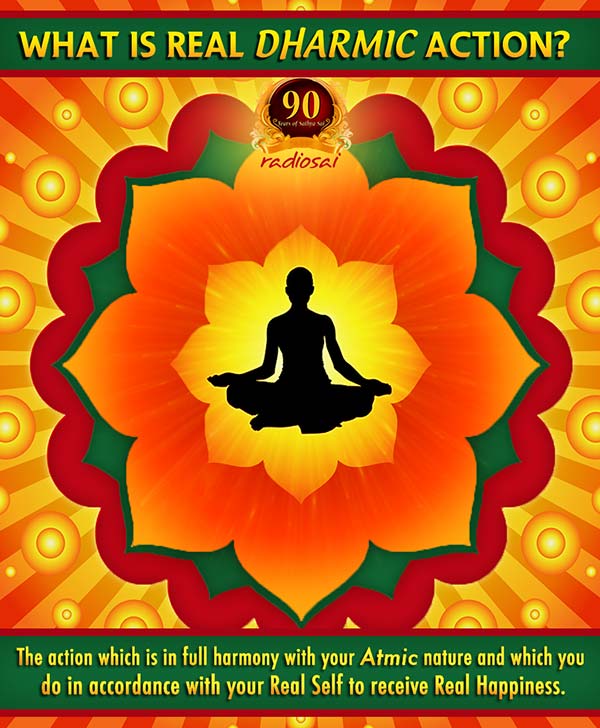 |
The point is very important because many people, especially in politics, often justify unfair practices including corruption with the dubious argument: “Look I do not want any money personally; I have enough. But to stay in power one needs money; how can one win elections without money? Therefore I collect money so that I can stay in office and serve the people. I am doing all this for public good! That is all.”
This argument has been put forth many times but it simply does not wash! Humans may be fooled, people could fool themselves with such dubious excuses, but God is not fooled; He never was and He never would be – that is what Swami says.
The Universe was created by God, and it has a Moral undercurrent. One must never go against it; it is as simple as that. While on this subject, a minor clarification. People sometimes ask: “What if any is the connection between Sathya and Dharma?" Swami has the answer. He says that Dharma is nothing but Sathya in action from which it follows, as stated above, that Sathya and Dharma are really inseparable like the two sides of a coin are. All this might sound a bit heavy and difficult to understand but if we pause for a moment and reflect, what Swami says is not all that difficult to grasp.
Let us now do a bit of revision. The first thing Bhagawan says is, “O man, do you know what real Dharmic action is? I shall tell you. It is that action which is in full harmony with your Atmic nature. You might wonder why God wants you to do that. Well, don’t you want to be happy? Are you not doing all sorts of things in order to be happy? You are, are you not? All I am asking you to do is to act in accordance with your Atmic nature, Real Self, True Self, call it what you will, because that way you would attain Real Happiness.”
This automatically raises many questions, especially in the minds of people not used to Spirituality. They would, shaking their heads, say, “Listen, the key to happiness is money, lots of it. Don’t you know if you have plenty of cash, you can buy your way out of any problem or difficulty? With wealth, one can have a nice house with many rooms all air-conditioned and full of the latest gadgets, a couple of luxury cars, and vacation homes in many resort areas. With money one can travel wherever one wants, have rich and influential friends, etc. etc.”
Vedanta’s response is: “Oh man, all that you say might appear to be true but to what extent? Wealth can go away, in fact even evaporate suddenly. Or else, you may have terrible medical problem like near paralysis. Of what use is your wealth at that time? At best, you can buy expensive medical attention. The problem might not be physical but mental, like deep depression caused by traumatic family life or whatever. What then? What can your wealth do in such a situation? Are you not aware of many rich people who lead an utterly miserable life?”
This might sound very terrible and even negative. One would ask, and indeed many do, “Does this mean that man is condemned to eternal misery? That life has no purpose? That it is meant to be a huge burden? How can that be?”
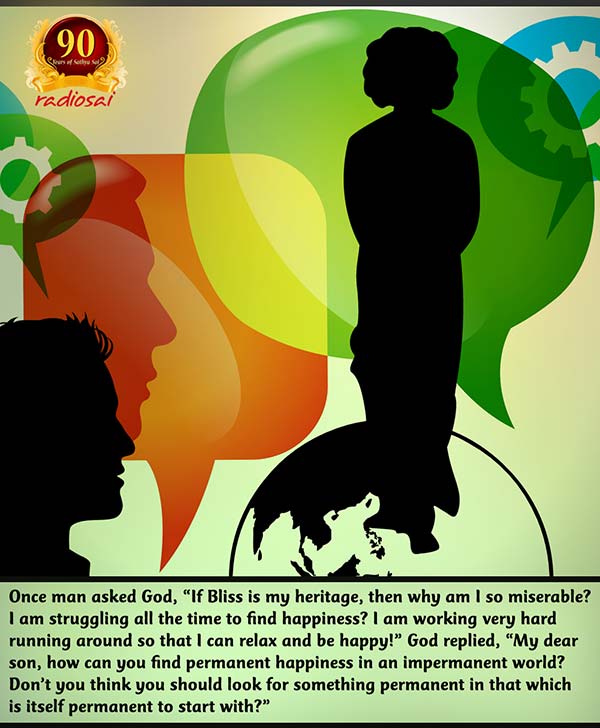 |
Swami’s answer is - and this is very important; so we had better pay careful attention to it - He says: “Oh man, no one is declaring that you are born to be miserable; not at all. God in His Infinite Compassion and Love has given you this life so that you can work your way to not just transient pleasure but Eternal Bliss. You know why? Because, Bliss is your True Nature. O man, do not be deluded by the body; you are not the body but the Eternal Atma and Bliss is the Nature of the Atma. So, Bliss is your real heritage.”
I am sure you are totally lost! So, let me help you out with the following dialogue between man and God.
Man asks, “God, if Bliss is my heritage, then why I’m so miserable?”
God replies, “Son, that is because you are not opening the door to Eternal Happiness!”
Man is astounded; wonderstruck he asks, “But God, don’t You know that I am struggling all the time to find happiness? I am working very hard running around so that I can relax and be happy! How can You say I am not seeking happiness?”
God answers: “My dear fellow, I am aware you are trying to find happiness but how can you find it if you look in the wrong place?”
Man then to God: “Oh Heavenly Father! I live in this world; this is all I can see and experience. That being the case, where else can I seek happiness other than in this world?”
God responds, “But man, do you want fleeting happiness or real lasting happiness?”
Man is astounded by the question and says, “God, who would want transient happiness? I want permanent happiness; indeed, everyone wants that.”
God smiles and says, “Son, I am happy to hear that you want permanent happiness but are you aware that you are looking for it in the wrong place?”
Man is stunned and struggles to find words; feebly, he says, “But God why are You saying that?”
“Well,” says God, “tell Me dear son, how can you find something permanent in an impermanent world? Don’t you think you should look for something permanent in that which is itself permanent to start with?”
I slipped in this imaginary dialog between man and God mainly to stress that in this transient world, pleasure ALWAYS comes with pain; they are like two sides of a coin. Can one ever have a coin with just only one side? NO!
Well, that might seem like depressing news! So what is man to do? Is everything lost? Not really. Let us go back to some of the things I said earlier and break them down into simple steps and rules. Swami says the following:
• God wants man to follow Dharma because that way, man would unite permanently with God. This is what is called merging with the Absolute.
• When one merges with God, the merger is for ever which means that one is permanently free from bondage.
• Freedom from bondage also means freedom from pain, misery and suffering. Remember, bondage means being a slave to desires, greed, anger etc. every one of which is sure to bring pain and suffering.
• OK, one is free, and there is no bondage? What happens? The answer is simple – permanent Bliss. That’s the main point.
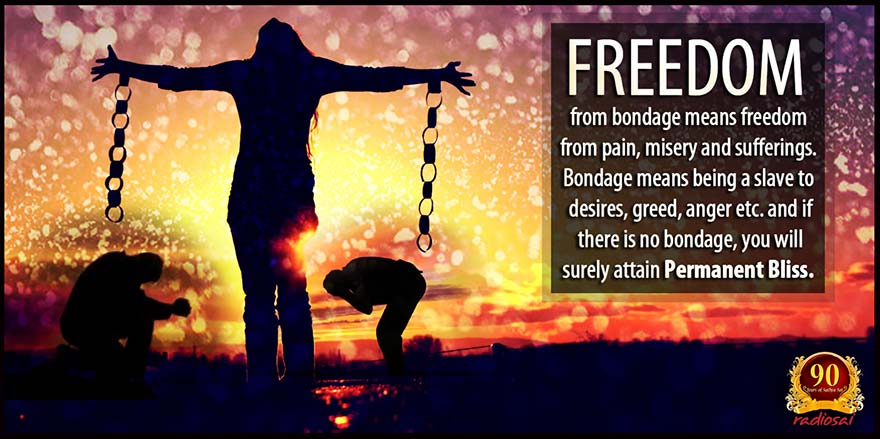 |
I am aware that all this would be difficult to understand and even more difficult to put into practice because of the way we have been brought up and the worldly attitudes that have been etched and frozen into us for many years. But times are such and the difficulties that humanity faces are so huge, that we have no choice but to get back to basics; and there is nothing more basic than Sathya and Dharma. While Sathya is the concept, Dharma is the practical manifestation of Truth via action. While Sathya is the foundation, Dharma is the superstructure which can be even as huge as a skyscraper.
May be I can give a little analogy or example to illustrate what is meant by being in constant tune with Sathya and Dharma. Those of you who are familiar with classical Indian music would have noticed that musicians invariably have an instrument called the tambura that provides a background drone throughout the concert. No matter what song is sung, no matter what the tune or the raga is, no matter in which region of the scale the musician is wandering, the cardinal rule that he must always be in tune with sruthi or the drone of the tambura. Listen to this clip which provides an example.
Got the idea? Good! The point being made is that in life, all actions must ever be in tune with Sathya and Dharma, even as musicians are required never to deviate from the sruthi. If they deviate, it is called apasruthi and regarded as distortion of music. Similarly if action deviates from Dharma, it becomes Adharma – that is not difficult to follow, is it?
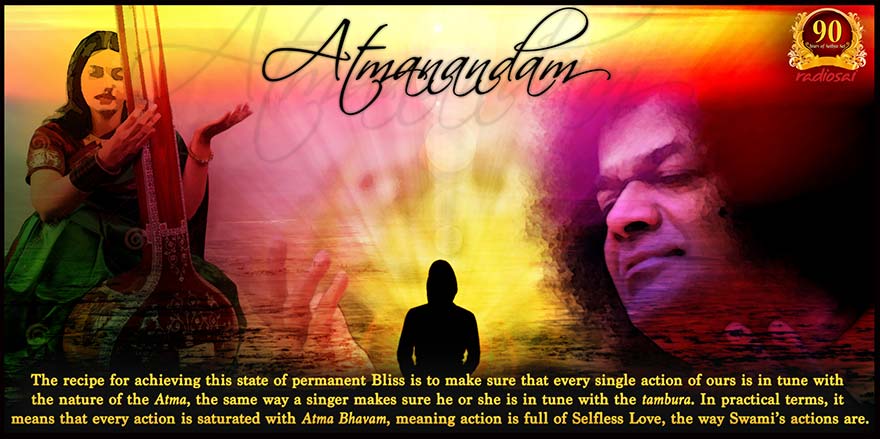 |
Let us now gather our thoughts and see what all we have learnt thus far. I would put it as follows:
• Adhering to Dharma is essential for becoming one with God.
• Once one becomes one with God, one ceases to experience pain since one is transported to a state of permanent Bliss.
• And the recipe for achieving this state of permanent Bliss is to make sure that every single action of ours is in tune with the Nature of the Atma, the same way a singer makes sure he is in tune with the tambura.
• In practical terms, it means that every action is saturated with Atma Bhavam, meaning action is full of Selfless Love, the way Swami’s actions are.
I think I have said enough and maybe I should sign off at this point! Take care!
God bless, and Jai Sai Ram.
Part 01 || Part 02 || Part 03 || Part 04 || Part 05
- Radio Sai Team
What are your impressions about the Article? Please let us know by writing in to h2h@radiosai.org or you may leave your thoughts in the comments section. Do not forget to mention your name and country.
| comments powered by Disqus |







